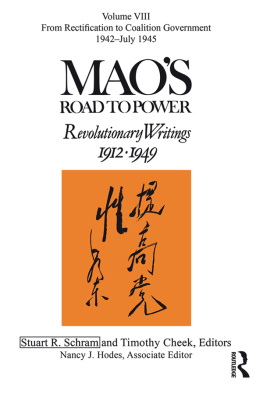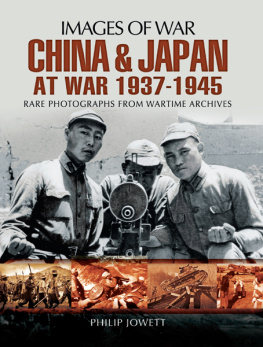Operational Policies for Troops Entering Henan
(July 15, 1945)
To the Henan Regional Party Committee:
1. After our army entered Henan, it made distinguished accomplishments in terms of fighting the enemy, mobilizing the masses, and building the Party and administration. Your leadership is correct.
2. Your operational policy from now on is to defend on the west and attack on the east and the south. (This means taking a defensive policy toward the area occupied by diehard troops and an offensive orientation toward the area occupied by the enemy.) In time you will completely integrate with Taiyue and Taihang on the north, with units crossing the New Yellow River on the south. We can then gradually recruit millions of the masses, expand the militia, guerrilla, and main forces (if finances permit), and build up dependable military, political, and economic foundations to make all preparations within one year for a major attack by Hu Zongnan. If we do not take the time to finish the above tasks, our Party in Henan will be defeated. We must anticipate this point.
3. You must rely on your current strength and self-reliance to complete the above tasks. You must not hope for the center, Taihang, or Taiyue to provide further assistance in military force, finances, or cadres. It is necessary and beneficial to make the above tasks clear to all responsible cadres and to rely on yourselves in concert with the people of Henan to solve all problems without external aid.
4. You, of course, have various advantageous conditions to complete the above tasks. Nonetheless, you will inevitably run into various kinds of internal and external difficulties. You should anticipate and spiritually prepare for this. Then you can implement various kinds of cautious, resolute, and appropriate steps and implement various kinds of correct military policies, policies of resolutely mobilizing the masses, financial policies based on rent reduction, interest reduction, and the development of the public and private economy, and internal policies of unifying the various parts of the army and the cadres, especially local cadres, in order gradually to overcome internal and external difficulties.
5. You should establish close connections with the Shanxi-Hebei-Shandong-Henan Central Bureau (which will be established soon) and the Hubei-Henan-Anhui Border Region Party Committee and inform them and us of your various activities.
The Central Committee
Notes
Our source for this document is Mao Zedong wenji , Vol. 3, pp. 44243. where it is reproduced from Mao Zedongs handwritten manuscript.
. On the New Yellow River, see above, note to the text of July 14, 1945.
. Referring to the Fifth Division of the New Fourth Army, with Li Xiannian and Zheng Weisan as its commander and commissar, respectively.
Report on the Question of the Dissolution of the Communist International
(May 26, 1943)
On the evening of May 26, when Comrade Mao Zedong appeared on the speakers platform of the mass meeting of cadres in Yanan, he was greeted with thunderous applause. This meeting had been called by the Secretariat of the Chinese Communist Party to transmit the two historic documents from the Presidium of the Communist International and from the Central Committee of the Chinese Communist Party. read out the two documents. Comrade Mao Zedong, in his capacity as chairman of the Politburo of the Chinese Communist Party, made a report to the meeting.
Comrade Mao Zedong first pointed out:
The dissolution of the Communist International [Comintern] is, precisely as the American press agencies have reported, an epoch-making great event. This judgment has been confirmed by the fact that during the past four days, the greatest attention has been paid to this event by everyone, regardless of whether they belong to the anti-Fascist or the Fascist camp, regardless of party or faction.
Comrade Mao Zedong asked:
Why should the Comintern be disbanded? Did it not devote all its efforts to the emancipation of the working class of the whole world and to the war against fascism?
Comrade Mao Zedong said:
It is true that the Comintern was created by Lenin himself. Throughout its entire existence it has rendered the greatest services in helping each country to organize a truly revolutionary workers party, and it has also contributed enormously to the great cause of organizing the anti-Fascist war.
Comrade Mao Zedong pointed particularly to the great services of the Comintern in aiding the cause of the Chinese Revolution. He said:
The influence of the Comintern on the Chinese people is very great. The reason for this is that although China is an economically backward country, during the past twenty-two years it has gone through three great revolutionary movements in succession, and the Comintern gave great assistance in all three of these movements, the Northern Expedition, the Agrarian Revolution, and the Anti-Japanese War of Resistance.
Comrade Mao Zedong spoke of how, on the eve of the Northern Expedition, the Comintern aided Sun Yatsen, and the Guomindang under his leadership; how, in 1924, a reorganization was carried out, and cooperation was established between the two parties, the Communists and the Guomindang. He mentioned historical facts, such as how, at that time, Chiang Kaishek, on instructions from Sun Yatsen, visited Moscow, and how a representative of the Guomindang participated in meetings of the Comintern, and he went on to say:
This suffices to demonstrate that the support of the Comintern for the Chinese Revolution and its influence among the Chinese people has always been very great, even without mentioning the subsequent Agrarian Revolution and the present Anti-Japanese War of Resistance.
Comrade Mao Zedong further pointed out:
Revolutionary movements can be neither exported nor imported. Even with help from the Comintern, the birth and development of the Chinese Communist Party resulted from the fact that China herself had a conscious working class, and the Chinese working class created its own partythe Chinese Communist Party. The Chinese Communist Party, although it has a history of only twenty-two years, has already undertaken three great revolutionary movements.
Since the Comintern has rendered such great services to China and to various other countries, why should it be necessary to proclaim its dissolution?
To this question Comrade Mao Zedong replied:
It is a principle of Marxism-Leninism that the forms of revolutionary organizations must conform to the necessities of the revolutionary struggle. If a form of organization no longer suits the necessities of the struggle, then this form of organization must be abolished.
Comrade Mao Zedong pointed out:
At present, the form of revolutionary organization known as the Comintern is no longer suited to the necessities of the struggle. To continue this organizational form would, on the contrary, hinder the development of the revolutionary struggle in each country. What is needed now is the strengthening of the national Communist Party in each country, and we no longer need this international leading center. There are three main reasons for this:
1. The internal situation in each country and the relations between the different countries are more complicated than they were in the past, and they are changing more rapidly. It is no longer possible for a unified international organization to adapt itself to these extremely complicated and rapidly changing circumstances. Correct leadership must grow out of a detailed analysis of these conditions, and this makes it even more necessary for the Communist Party of each country to undertake this itself. The Comintern, which is far removed from the concrete struggle in each country, was adapted to the relatively simple conditions of the past when changes took place rather slowly, but now it is no longer a suitable instrument.








